Geology
Geology is the scientific study of the Earth, its materials, processes, and history. It is a broad field that encompasses the study of rocks, minerals, landforms, and the processes that shape the Earth's surface.
Branches of Geology
Geology can be divided into several sub-disciplines:
- Physical Geology: Focuses on the study of Earth materials, such as minerals and rocks, and the processes that shape the Earth's surface, such as erosion and plate tectonics.
- Historical Geology: Examines the Earth's history and the processes that have shaped it over time, including the formation of mountains, continents, and oceans.
- Environmental Geology: Deals with the interactions between humans and the Earth, including the impact of human activities on the environment and natural hazards such as earthquakes and landslides.
- Geochemistry: Focuses on the chemical composition and processes of the Earth and its materials.
- Geophysics: Involves the study of the Earth using physical principles, such as gravity, magnetism, and seismic waves.
Key Concepts to Study
When studying geology, it's important to have a good understanding of the following key concepts:
- Rock Types: Igneous, sedimentary, and metamorphic rocks, and the processes that form and transform them.
- Plate Tectonics: The theory that the Earth's outer shell is divided into several plates that move and interact with each other, leading to the formation of mountains, earthquakes, and volcanoes.
- Mineral Identification: Understanding the physical and chemical properties used to identify and classify minerals.
- Geological Time Scale: The division of Earth's history into eons, eras, periods, and epochs based on significant geological and biological events.
- Earth Processes: Including erosion, weathering, deposition, and the formation of landforms such as mountains, valleys, and coastlines.
- Natural Hazards: Understanding the causes and impacts of natural disasters such as earthquakes, tsunamis, and volcanic eruptions.
Study Tips
Here are some tips for studying geology effectively:
- Make use of diagrams, maps, and models to visualize geological processes and concepts.
- Practice identifying rocks and minerals using physical and chemical properties.
- Use flashcards to memorize key terms and concepts, such as the names of geological periods and major geological events.
- Take field trips to observe geological features in nature and gain a better understanding of how they form.
- Stay updated with current geological events and discoveries by reading scientific journals and news articles.
By mastering the key concepts and studying effectively, you can develop a solid understanding of geology and its significance in understanding the Earth's past, present, and future.
.◂Biology Worksheets and Study Guides High School. Vertebrates II
Worksheet/Answer key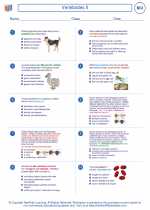 Vertebrates II
Vertebrates II  Worksheet/Answer key
Worksheet/Answer key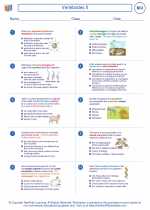 Vertebrates II
Vertebrates II  Worksheet/Answer key
Worksheet/Answer key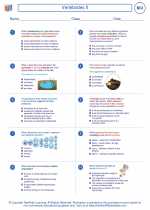 Vertebrates II
Vertebrates II  Vocabulary/Answer key
Vocabulary/Answer key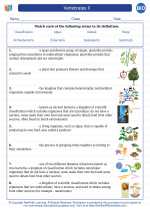 Vertebrates II
Vertebrates II  Vocabulary/Answer key
Vocabulary/Answer key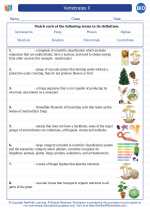 Vertebrates II
Vertebrates II  Vocabulary/Answer key
Vocabulary/Answer key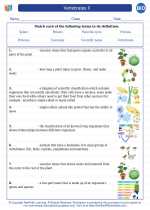 Vertebrates II
Vertebrates II 

 Worksheet/Answer key
Worksheet/Answer key
 Worksheet/Answer key
Worksheet/Answer key
 Vocabulary/Answer key
Vocabulary/Answer key
 Vocabulary/Answer key
Vocabulary/Answer key
 Vocabulary/Answer key
Vocabulary/Answer key

The resources above cover the following skills:
LIFE SCIENCE (NGSS)
Ecosystems: Interactions, Energy, and Dynamics
Students who demonstrate understanding can:
Use mathematical representations to support and revise explanations based on evidence about factors affecting biodiversity and populations in ecosystems of different scales.